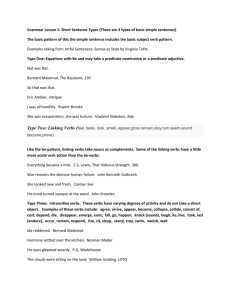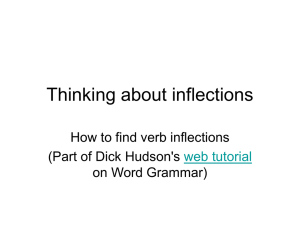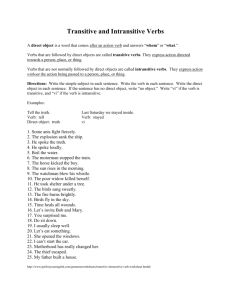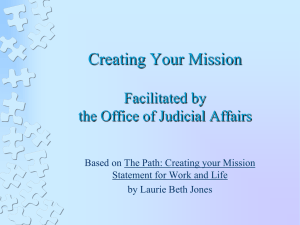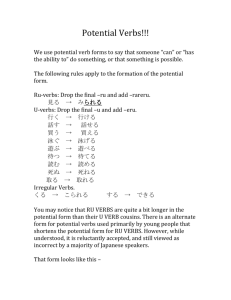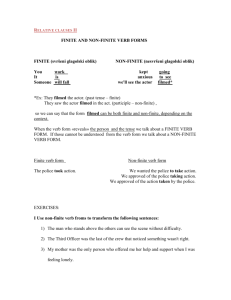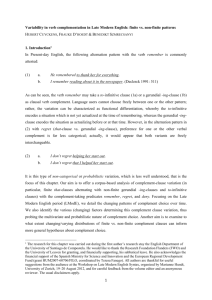Grade 9 – Verbs in detail worksheet
advertisement
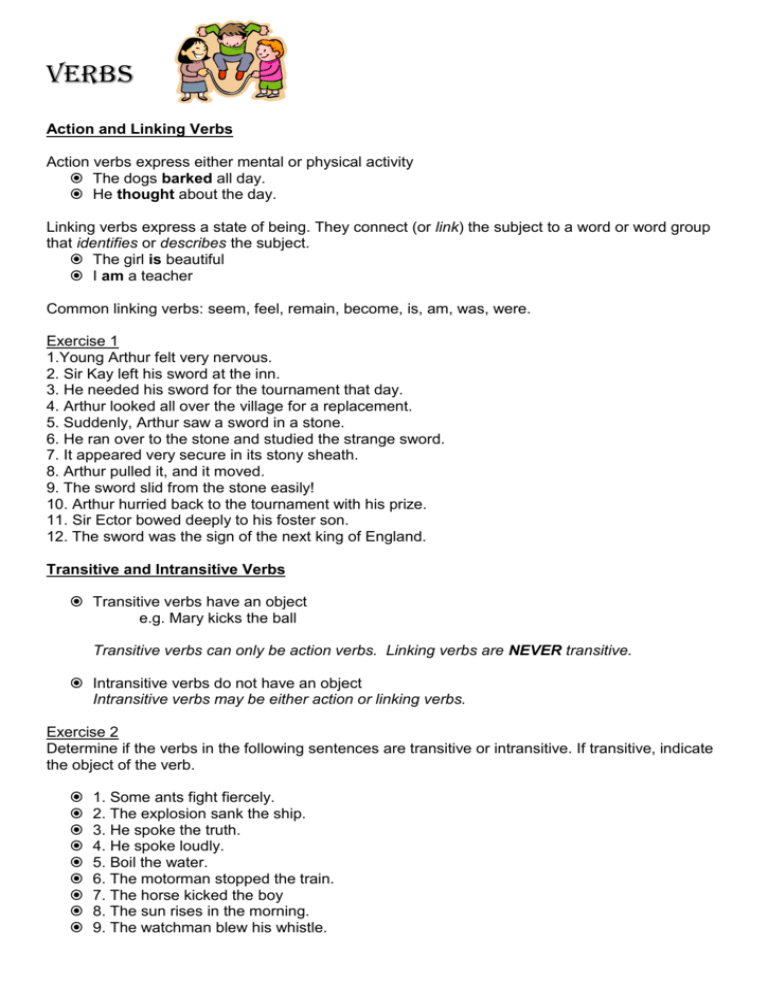
Verbs Action and Linking Verbs Action verbs express either mental or physical activity The dogs barked all day. He thought about the day. Linking verbs express a state of being. They connect (or link) the subject to a word or word group that identifies or describes the subject. The girl is beautiful I am a teacher Common linking verbs: seem, feel, remain, become, is, am, was, were. Exercise 1 1.Young Arthur felt very nervous. 2. Sir Kay left his sword at the inn. 3. He needed his sword for the tournament that day. 4. Arthur looked all over the village for a replacement. 5. Suddenly, Arthur saw a sword in a stone. 6. He ran over to the stone and studied the strange sword. 7. It appeared very secure in its stony sheath. 8. Arthur pulled it, and it moved. 9. The sword slid from the stone easily! 10. Arthur hurried back to the tournament with his prize. 11. Sir Ector bowed deeply to his foster son. 12. The sword was the sign of the next king of England. Transitive and Intransitive Verbs Transitive verbs have an object e.g. Mary kicks the ball Transitive verbs can only be action verbs. Linking verbs are NEVER transitive. Intransitive verbs do not have an object Intransitive verbs may be either action or linking verbs. Exercise 2 Determine if the verbs in the following sentences are transitive or intransitive. If transitive, indicate the object of the verb. 1. Some ants fight fiercely. 2. The explosion sank the ship. 3. He spoke the truth. 4. He spoke loudly. 5. Boil the water. 6. The motorman stopped the train. 7. The horse kicked the boy 8. The sun rises in the morning. 9. The watchman blew his whistle. 10. The poor widow killed herself. 11. He took shelter under a tree. 12. The birds sang sweetly. 13. The fire burns brightly. 14. Birds fly in the sky. 15. Time heals all wounds. Finite and infinite verbs All finite verbs have SNoT - Subject - Number - Tense Non-finite verbs are incomplete and either they need an auxiliary verb to become complete, or they are performing another function in the sentence. All sentences need a finite verb to be complete. There are two main types of non-finite verbs: participles (past & present) and infinitives. Recognize a participle when you see one. Participles come in two varieties: past and present. They are two of the five forms or principal parts that every verb has. Look at the charts below. Verb giggle help jump Simple Present giggle(s) help(s) jump(s) Simple Past giggled helped jumped Past Participle giggled helped jumped Present Participle giggling helping jumping Infinitive to giggle to help to jump Verb bring ring sing swim Simple Present bring(s) ring(s) sing(s) swim(s) Simple Past brought rang sang swam Past Participle brought rung sung swum Present Participle bringing ringing singing swimming Infinitive to bring to ring to sing to swim Notice that each present participle ends in ing. This is the case 100 percent of the time. On the other hand, you can see that past participles do not have a consistent ending. The past participles of all regular verbs end in ed; the past participles of irregular verbs, however, vary considerably. If you look at bring and sing, for example, you'll see that their past participles— brought and sung—do not follow the same pattern even though both verbs have ing as the last three letters. Recognize an infinitive when you see one. To sneeze, to smash, to cry, to shriek, to jump, to dunk, to read, to eat, to slurp—all of these are infinitives. An infinitive will almost always begin with to followed by the simple form of the verb, like this: + TO VERB = infinitive Important Note: Because an infinitive is not a verb, you cannot add s, es, ed, or ing to the end. Ever! Infinitives can be used as nouns, adjectives, or adverbs. Exercise 3 Say whether the bold word in each sentence is Finite or Non-Finite verb. 1. Paul runs to work every day. 2. We found him smoking behind the shed. 3. Amanda was reluctant to apply for the job. 4. My mom told me to go shopping. 5. I find speaking stressful. 6. They do not appreciate my singing. 7. My husband reminded me last night to buy milk. 8. On a nice day, I like to walk in the woods. Exercise 4 Find out the finite and non-finite verbs in the sentences given below: 1. 2. 3. 4. 5. 6. 7. 8. 9. 10. He gave me a chair to sit. It was a sight to see. I want to buy some clothes. Barking dogs seldom bite. He is about to leave. It is time to start. He was wearing a torn shirt. He had his shoes polished. They got the roof repaired. Finding the door open I went inside. Exercise 5 Find out the finite and non-finite verbs in the sentence below. If non-finite, say whether it is an infinitive, past participle, or present participle. 1. 2. 3. 4. 5. 6. 7. 8. If you ever needed to know the answers, he was the one to speak to. I was afraid. He walked towards me. The others had gone to the show; I suddenly felt alone. He gave me a cold look and my heart sank. Then he smiled and I knew I was safe. Walking towards me, I caught a glimpse of silver blade behind his back. Perhaps I was not safe after all. Exercise 1 1. linking: felt 2. action: left 3. action: needed 4. action: looked 5. action: saw 6. action: ran; action: studied 7. linking: appeared 8. action: pulled; action: moved 9. action: slid 10. action: hurried 11. action: bowed 12. linking: was Exercise 4 1. Finite – gave; non-finite – to sit 2. Finite – was; non-finite – to see 3. Finite – want; non-finite – to buy 4. Finite – bite; non-finite – barking 5. Finite – is; non-finite – to leave 6. Finite – is; non-finite – to start 7. Finite – was wearing; non-finite – torn 8. Finite – had; non-finite – polished 9. Finite – got; non-finite – repaired 10. Finite – went; non-finite – finding
